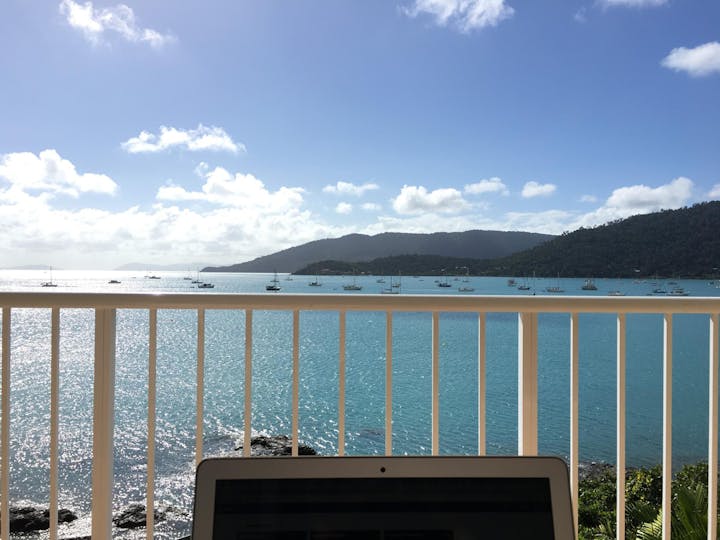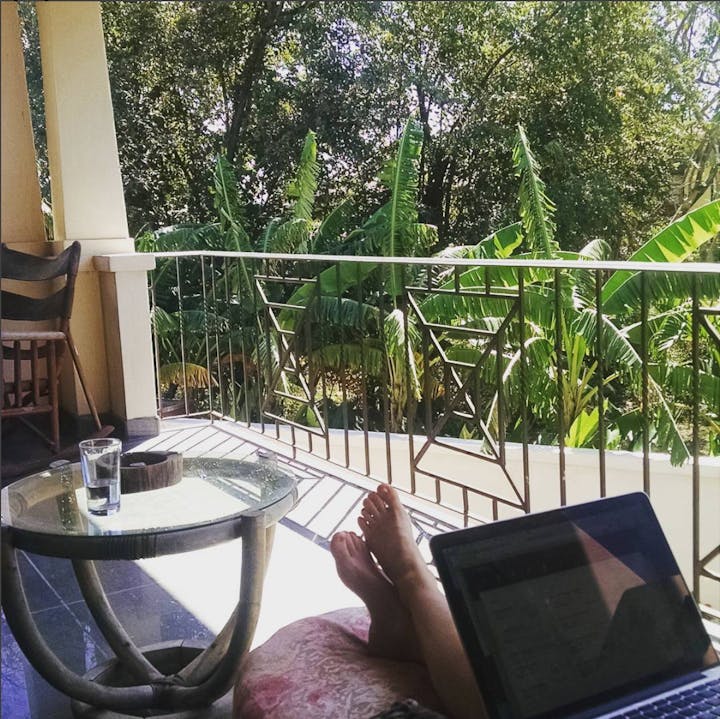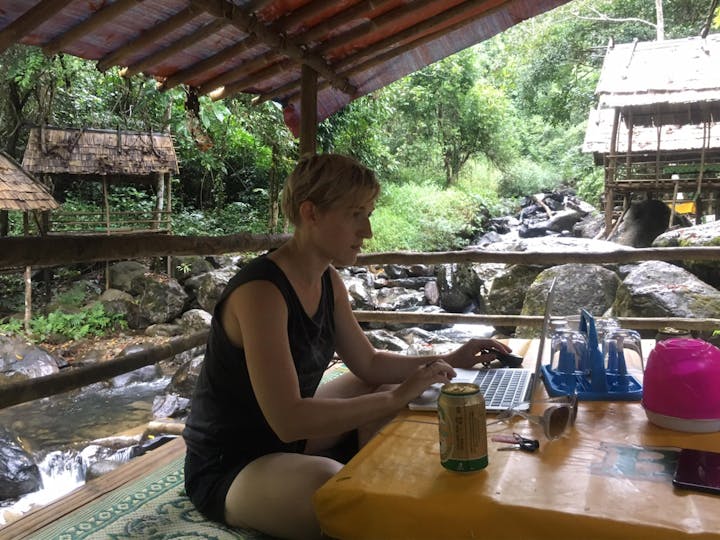9 Tips for Working While You Travel


Undoubtedly, one of the biggest perks of working remotely is the opportunity to work from anywhere in the world.
Remote work gives you the chance to travel and explore incredible new places while still being able to do the work you love.
I’ve had the privilege of working from several places across the world, like Airlie Beach and the Gold Coast in Australia, as well as Cape Town, South Africa. I find it inspiring to be outside of the regular four walls of my home office I’ve grown accustomed to. A different environment helps me approach work with renewed purpose and intention, and it helps me focus more than if I were just working from home.

My view working from a resort balcony in Airlie Beach, Australia
Since several teammates here at Help Scout have had amazing adventures traveling across the world while working, I asked for their advice so I could share it with others who’d like to do the same.
1. Make sure you have a trusty internet connection
To the extent you can, especially if you’ll be traveling somewhere service is spottier, sort out internet access before you need to be online. Don’t just trust the Airbnb listing that says there’s Wi-Fi — ask the host what upload/download speeds are. Find out where the coffee shops or coworking spaces are, and test a couple different locations if you can, in case you need to relocate. Forums like Nomadlist are good resources to ask other digital nomads where the best spots are.
Emily Triplett Lentz

Emily works from a patio in Guanajuato, Mexico
Wi-Fi speed and dependability are vital for remote work, so it was somewhat of an ongoing concern as we moved from place to place. We quickly learned to ask potential landlords to send a screenshot of a speed test before committing to an Airbnb. We found coworking spaces provide a solution to both of these issues. A comfy work space plus dependable Wi-Fi gave us peace of mind and made remote work on the road more sustainable. An added bonus was that it helped us make new friends.
Kristi Thompson

2. Set focus blocks when you’re in a different time zone
By being in a different time zone than the rest of my team, I was able to dedicate my mornings to catching up on emails and crunching numbers while everyone was offline. It allowed me to be more focused and intentional with my time, so that by the time everyone signed online, I had gotten a lot accomplished and could focus on more team-centric tasks.
Tim Thyne
3. Keep an open mind
Do your research, but understand that everyone is different, and that glowing reviews of a country/city/area/monument/activity/etc. (online or in person) don’t always mean that you will enjoy it. Professional or retouched photos (e.g., on Instagram) can also add to the perception of a place and set your expectations too high. It’s usually best to keep your expectations low, enjoy what you see, and be pleasantly surprised rather than the other way around.
Michal Kierat

4. Find and bring along your ‘anchors of stability’
Having been on-the-go so often, I’ve had to learn how to easily make any new places feel like home quickly, whether it’s a hotel, an Airbnb, or a friend’s spare room. There are a few constant things that I’ve discovered are the anchors of stability for me. Although they are not necessary items for traveling, I always have them with me so that I can have my me-time and re-charge when I’m away from home. For example, I bring packets of miso soup and Shin Ramyun instant noodle flavouring with me so that I can eat it with rice or noodles; I will always look for a coffee shop that makes soy lattes (no shame!); I have a Chromecast so that my partner and I can watch our favourite TV shows in comfort; we have an Xbox controller so that we can play games on the computer; and I have my favourite pillowcase. I’d recommend thinking about what your anchors are!
Amanda Fong

5. Stick to your normal routine
No matter where I work from, I try to stick to a routine. I always wake up and have a good breakfast, then find a quiet space to work without interruption. I like to end the work day by getting some sunshine, as this helps ensure that I am productive and have a good work-life balance, no matter the location or circumstances.
Kristi Thompson
6. Set aside time to explore
At home, I often work through lunch and linger online well past 6 p.m. Abroad, however, I gave myself an hour lunch to explore or hit a temple and work at a more touristy lunch or coffee destination, and come 5 or 6 p.m., that laptop was closed. Also, don’t be over-ambitious. Since you’re working, you should book three times longer in a place than you would if you were just traveling — otherwise you’ll be forced to miss out on some stuff.
Mo McKibbin

Traveling takes a lot of time. I don’t necessarily mean on the plane/train/boat/etc. itself, but just the logistics and planning of where you’ll go, how you’ll get there, where you’ll sleep, work, eat, do laundry and so on. You have a full-time job, plus another part-time one to make the traveling happen. So you block out time in the day for the full-time job and you cannot spend all of your remaining time enjoying the place you are in, as you have to share it with planning the next steps in your journey. That’s not ideal, but it’s totally outweighed by the fact that you can visit new places around the world, stay however long you choose to, and not burn through your savings.
Michal Kierat
7. Set a hard cut-off time for the day
While at home, I didn’t always have a cut-off time for checking my email or Slack, so it was easy for work to creep into my evenings. While traveling, though, I set a hard cut-off time for the day, so that when I was done with work, that was it. If any emails or Slack messages came in after that cut-off point, I’d just check it the next day. It helped ensure I had plenty of time to enjoy the city I was in and explore. I’ve also tried to carry this since getting been back home, so that I don’t get caught up in work in the evenings.
Tim Thyne

8. Get the right gear
Get your gadget game in order: a pocket mifi, external battery (you may need to work on a 12-hour train — or boat! — with no outlets), and plug adapters are musts. Also make sure to get Google Authenticator on your phone for all your two-factor sign-ins. Some services won’t always send a Google Authenticator number to your phone if it’s abroad.
Mo McKibbin
9. Travel light, travel comfortably
The less you travel with, the easier it is to move locations and the quicker you’ll settle into a new spot. You need much less than you think you need. Also, while I only travel with a carry-on bag, I've decided it’s worth it to bring a mouse, keyboard, and laptop stand. I spend enough hours on my laptop that it’s important I can work in comfort.
Kristi Thompson
Real life ≄ Instagram
While it’s a tremendous privilege to explore the world while doing the work you love, it’s important to note that it’s easier said than done. Social media has glamorized the remote lifestyle, while downplaying its downsides. (How many haggard, post-flight-delay 2 a.m. selfies get posted compared to, say, pedicured toenails on a beach?) Yet it’s worth researching and investing time into the the nitty-gritty aspects of the adventure as well.
Related: The Digital Nomad’s Toolkit for Staying Productive
It takes thoughtful and intentional planning to consider the logistics of what you’ll need to bring along, ensure you’ll have a comfortable working environment for eight hours, and set aside time to explore your new surroundings. We hope the tips above will help make your digital nomad adventures not only efficient, but fun and rewarding.
